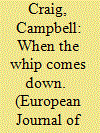| Srl | Item |
| 1 |
ID:
148388


|
|
|
|
|
| Summary/Abstract |
In the history of warfare, ground and naval forces frequently have to cooperate. There are usually problems putting these two forces together since their missions, equipment, training, communications and mutual unfamiliarity get in the way. These problems are common during transport of ground force equipment and personnel aboard naval vessels, exacerbated during amphibious landings and assaults and very difficult when operating together along major rivers. This article analyzes the Soviet history of defensive river flotilla combat during the first period of the Great Patriotic War (World War II against Germany). It outlines missions, the operational environment, lessons learned, the command and control problems experienced between naval and ground forces and the challenges of conducting such operations.
|
|
|
|
|
|
|
|
|
|
|
|
|
|
|
|
| 2 |
ID:
153505


|
|
|
|
|
| Summary/Abstract |
This article examines the conflict between traditional Marxist attitudes toward war and the problem of the nuclear revolution. It shows how the advent of the nuclear revolution in the 1950s undermined traditional Marxist-Leninist concepts of war, and then goes on to argue that this development must be placed at the centre of contemporary Marxian IR if it is to have explanatory power in the twenty-first century. To make this case directly, it engages with Justin Rosenberg’s revival of Trotsky’s idea of uneven and combined development and its subsidiary law of ‘the whip of external necessity’, and argues that the whip can remain salient today only if one accepts the political utility of nuclear war. The impasse created by the nuclear revolution, it concludes, points Marxist IR in the direction of classic Marxist visions of supranationalism and human unity.
|
|
|
|
|
|
|
|
|
|
|
|
|
|
|
|